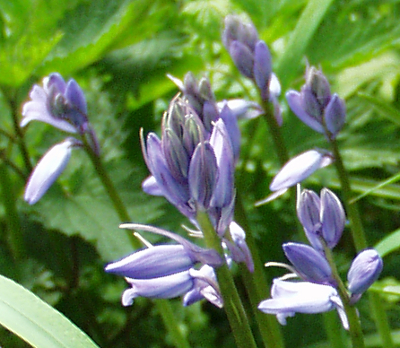Hybrid bluebell |


Habitus and budding plants of the hybrid bluebell
| Hyacinthoides × massartiana: | |
| Blooming period: | April–May |
| Height: | 20–50 cm |
| Flowers: | bisexual, actinomorphic, mostly blue, conspicuous, Ø 10–20 mm, stamens: 6, styles: 1 |
| Tepals: | 6, blue |
| Leaves: | 3–8, basal, parallel-veined |
Plant perennial, herbaceous with 1–2 cm thick bulb.
Stem usually upright, incl. flower scape 20–50 cm high
Leaves 3–8, simple, entire, basal, acute, 10–30 mm wide, about as long as the stalk.
The stalks bears a few cm long flower scape with a raceme of 4–15 unilateral, nodding, bell-shaped, slightly fragrant flowers.
Pedicels 8–20 mm long, surrounded at the base by 2 linear-lanceolate bracts.
The 6 blue, pink or white, identically looking, 12–17 mm long tepals are free, the tips are bent back at an angle of 90 ° –180 °.
Below the center of the petals arise 6 incurvate stamens with mostly cream colored anthers.
After insect pollination (bees, bumblebees, wasps) are formed from the superior ovary, which bears a blue style, 3-part, many-seeded, ovoid capsule fruits.
Propagation also by formation of daughter bulbs. Plants poisonous in all parts!
Hyacinthoides × massartiana is a fully fertile hybrid of Hyacinthoides hispanica and H. non-scripta.
| Floral formula: |
| * [P3+3 A3+3] G(3) superior |
Occurrence:
Roadsides,
river banks, parks, public gardens, often near human settlements.
Prefers slightly moist, nutrient-rich soils and sunny positions to
partial shade.
Distribution:
As
an ornamental plant spread worldwide. The populations in the Emsland
are based on feral garden plants.